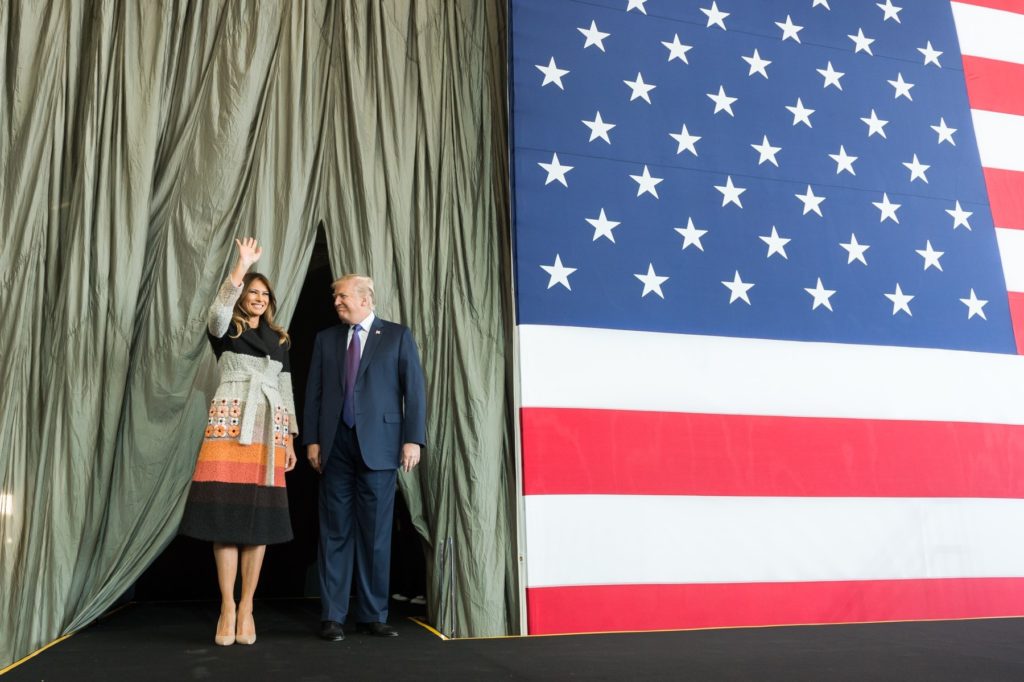The Age of Trump: Right Here, Right Now
By • November 18, 2017 0 568

Historians like to sum up their sphere of interest in terms of ages as in “the Age of Napoleon” or “the Age of Revolution” or “The Age of Roosevelt.”
Will Durant, the venerable and popularizer historian produced a whole series of very long, thick and readable books that centered around the thematic conclusion of great ideas and great men as in “The Age of Rousseau” and “The Age of Voltaire,” that duo which inhabits opposing side of the Age of Enlightenment. Such categories were natural for Durant, as he had a passion for philosophy and focused thus in his 20th-century writings, during which we might call “The Age of Books.”
Of late, the times in which we live have been quite a time for ages as well. Take your pick: “The Age of increasingly destructive natural disasters and the coming of global warming for real,” “The Age of Mass Killings and Shootings in America,” “The Age of Harvey Weinstein and the Rise of Public Outrage Against Sexual Harassment and Sexual Assault,” “The Age of Permanent Class and Political Division in America,” “The Age of Terrorism and Extremism,” “The Age of Twitter” . . .
. . . Or, for short, “The Age of Trump” — not that Donald Trump, the former New York entrepreneur, developer, conspiracy pusher, and bon vivant, who was elected President of the United States in a startling upset over Hillary Clinton in 2016, can be blamed or credited with the realization of all these ages and probably a few more.
Many of the issues—races, gender, populism, terrorism, partisanship, the gap between rich and poor and so on, have been festering as a part of the American cultural and political scene for some time.
Most of the “ages” mentioned came to a kind of new prominence and climax during the political rise of Trump which could be placed somewhere between his tightly held “birther” claim against President Barack Obama, his rise as a star of the popular reality show, “The Apprentice,” his “We’ll build a wall” entry into the presidential race, his amazingly almost inevitable takeover of the GOP to become its nominee and his general election victory.
This is not the place or time to delve into the roots and reasons of his victory—books have already been written about that—but rather the results of that victory in the national imagination and the way we lead our daily lives.
Living in the Age of Trump resembles a little like having an irascible relative move into your house and never leave, bounding around the house like a lumberjack, insisting on ordering out for steak, bellowing and bragging, arguing with grandma, tripping over children, telling outrageous stories that become true through repetition, insulting your friends and generally behaving badly, threatening to sue if you try to kick him out. You think about him all the time.
Or it’s like coming down with the worst flu that takes up permanent residence in your mind and body, a flu that can only be dealt with pills or medicine in which the side effects are worse than the cure. It’s like the first sign that you may be binge watching “The Walking Dead.”
It’s like being hacked every day. It’s like hearing knocks on the door, or the FBI fake-calling you because you know somebody named Muhammed.
It’s like the Age of Trump. Which manifests itself every day in every way. In the Age of Trump, bigots, white supremacists and mad men feel entitled to act out and they do, in horrible shootings in a church and from a Las Vegas hotel. In the Age of Trump, Trump has a word for every criticism: “fake news.”
His tour of Asia which is now winding down seem like a main street parade showering him with praise—the man loves his praise—in Japan, Korea, China, Viet Nam and the Philippines—where he got to shed his usual long-tie-dark-suit outfits for more Asiatic wear. The threat of war with North Korea still looms, nonetheless. He had a quick meeting with Russian President Vladimir Putin in Viet Nam and told the world that Putin told him personally he had nothing to do with Russian interference in the 2016 elections and that he believed him.
Other than offering condolences and prayers, Trump had little to say about the shootings at a small-town church in Texas, other than it was a problem about mental health, and that it was too soon to talk about guns.
As Gilda Radner once said, “It’s always something,” and those somethings are a highlight, a character mark of the Age of Trump.
Which gives good reason to name this “The Age of Twitter” after all. It was Twitter which made mogul, candidate, nominee Trump the omnipresident. Every adviser, ever restrainer, chief of staff and even relative, has tried to keep the president from going on Twitter and expressing his thoughts about everything from “crooked Hillary” to bad deals to American military might to Michael Moore and Rosie O’Donnell. This is why the job of press secretary has become very much like the job of the person with the shovel during a circus parade.
Welcome home, Mr. President.

